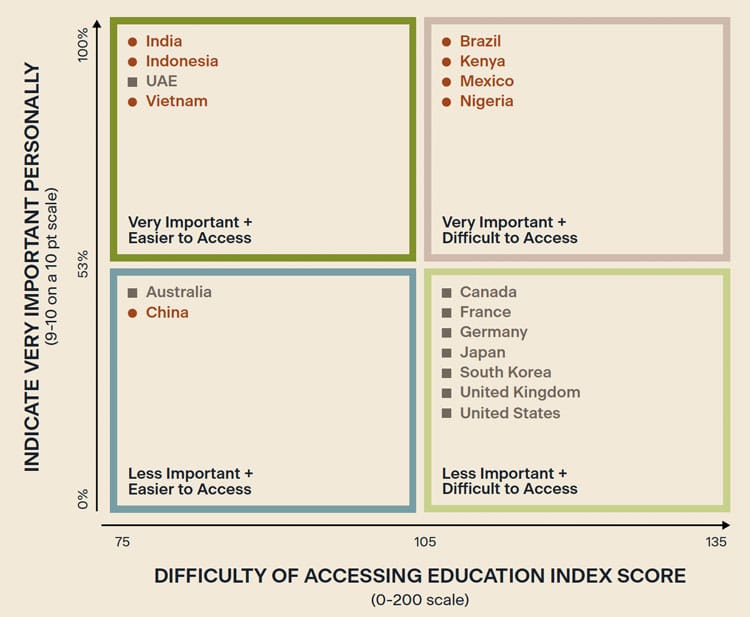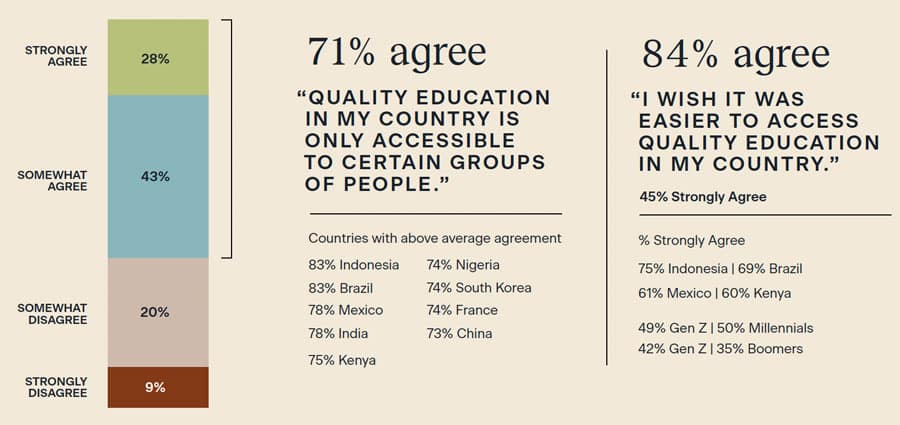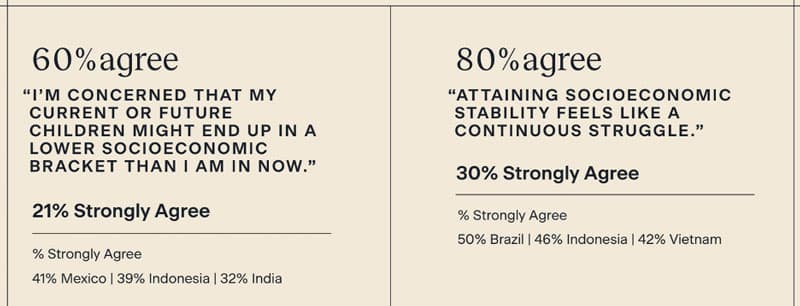Could alternative credentials become as valuable as degrees over the next decade?
- A major global survey finds that many people are struggling to access education and achieve upward mobility
- Survey respondents overwhelmingly understand the value of lifelong learning because of the growing need to acquire new skills to keep up with technology
A fascinating new report informed by a survey of 17,000+ respondents across 17 countries reveals that a significant majority of people across the world consider themselves “lifetime learners.” What’s more, most survey respondents believe that earning micro-credentials will be as important as earning a degree by 2035.
The report was produced by ETS, the world’s largest private educational testing and measurement organisation, and it is entitled the 2024 Human Progress Report. The authors consider that the development of successful societies hinges on three interrelated factors:
- Access to education
- Pursuit of upward mobility
- Engagement in upskilling/reskilling
ETS has pioneered a measurement system to create the “ETS Human Progress Index,” and this year’s survey serves as the baseline for the index to be updated annually. The aim is for the index to serve as “a gauge of global advancement and an opportunity to identify
gaps that demand increased attention.”
The surveyed countries were:
- Australia
- Brazil
- Canada
- China
- France
- Germany
- Kenya
- India
- Indonesia
- Japan
- Mexico
- Nigeria
- South Korea
- Vietnam
- UAE
- UK
- USA
Key findings
- 88% of global respondents said that to succeed in today’s hyper-competitive world, continuous learning is essential and tied to security and well-being.
- 86% agreed that “as time goes on, more jobs will require skills people don’t currently have.”
- Access to education is uneven across the world and “disparities in access are often rooted in socioeconomic status and government investment.” Interestingly, some of the countries in which citizens feel especially challenged in this sense are not the least developed, but often the most advanced (e.g., South Korea, France, Canada, UK, US).
- Respondents who are most pessimistic about the state of higher education in their country are from advanced economies, especially France (68% pessimistic) and South Korea (61% pessimistic).
- There is a sense that technology – and rapid advances in technology – lead to acquired skills quickly becoming obsolete, which underscores the importance of access to lifelong learning.
- More than three-quarters (78%) of respondents believe that being able to prove that a new skill has been mastered (e.g., by means of a certificate) will be as valuable as a degree by 2035.
- More than 7 in 10 respondents see a role for AI-generated guidance and assessments in the future.
Nuances of the findings
We can imagine that some responses are heavily informed by cultural context. For example, respondents in high-income countries were responding amid educational contexts that have been relatively advanced for years. Most of those respondents would not have experienced what it is like to live in a country with an objectively sub-par educational system. Such a bias might be reflected in the following chart from the report, where respondents in Brazil, Mexico, Kenya, and Nigeria occupy the top right-hand quadrant (“quality education is very important and difficult to access”) and respondents in Canada, France, Germany, Japan, South Korea, UK, and US are in the bottom right-hand quadrant defined in part by a (questionable) sense that quality of education is less important.

Respondents in mid-income countries were also more likely to consider that quality education is mostly reserved for more privileged members of their society.

Affordability is a key challenge
The top three barriers that respondents cited in terms of accessing quality of education are “too expensive/lack of financial resources” (57%), “socio-economic background” (32%), and “lack of qualified teachers” (31%). The relative affordability of micro-credentials is thus a major competitive advantage for providers of them – and we can imagine that this this advantage would become even more compelling if micro-credentials were better recognised and valued in formal educational systems.
Financial insecurity and worries about the future rise in certain countries
The following screenshot shows how much worry is present among many families in developing economies about their children’s future well-being and about staying financially solvent.

Entrenched social classes are an issue for many families in economies characterised by large gaps between the rich and poor. This is mostly a characteristic of poorer countries, but it is also the case in the US, which is home to the highest number of billionaires in the world. In the US, the top 1% of earners take 15% of all wages earned in the country.
Indians, Vietnamese, and Kenyans were the most likely to agree that “My family has historically faced challenges in achieving socioeconomic and financial security.” In the US, agreement with this statement was much higher among people of colour (POCs) than white people (26% vs. 13%, respectively).
The terrible toll of systemic inequality
The most cited reasons for an inability to achieve upward mobility were “income inequality” (39%), lack of job opportunities (34%), and “systemic bias (28%).
The role of AI
Acceptance of AI is rising around the world despite concerns about its potential to replace the value of human intelligence/innovation and to be used by bad actors. The ETS survey results reveal that global respondents see a role for AI to play in how people learn and are assessed: 78% agreed that “AI can enhance learning assessments by tailoring them to individual needs” and 72% agreed that they “would trust AI-generated guidance for improving skills.” That said, 71% consider AI to have the potential to “negatively impact learning assessments due to unintentional biases and programming flaws.”
Insights from the experts
Spiked into the ETS report are insightful quotes from experts, employers, and analysts. These include:
- “The biggest mismatches are now on the quality and relevance of skills.” —Andreas Schleicher, Director for the Directorate of Education and Skills OECD
- “Learning how to learn is probably the key skill. The half-life of skills is getting shorter as more and more technology comes in. The most important ability is learning how to use the new tools in the way that is resonant with being a human and the job to be done.”—Eric Lavin, Partner, Avalanche VC
- “Higher education is very slow to react … I think there are two major forces that are putting pressure on higher education. One is technology, and second is the needs of the market.”—Shai Reshef, Founder and President, University of the People
- “In the past, the benchmark for everyone was the same, we were all measured against the same criteria. In the future, we will be able to develop a personalised assessment, based on individual abilities and aspirations, which would be a great step forward.”—Joana Lenkova, Futurist and Strategist, Futures Forward
Future currency
As for the conclusions that can be drawn from the findings of the global survey, the authors of the ETS 2024 Human Progress Report write:
“Continuous learning emerges as the currency of tomorrow. Those proficient at leveraging certifications, micro-credentials and AI will lead the charge, creating innovative paths to success. The resounding acknowledgment of “lifetime learners” as a global majority highlights an inseparable link between continuous learning and individual security.
Despite challenges in accessing education, achieving upward mobility and engaging in upskilling/reskilling, society recognizes the importance of these factors for human progress. The challenges, while formidable, are not insurmountable. They demand innovative solutions, assessments and credentialling to ensure a holistic and accessible educational journey.”
For additional background, please see:
















